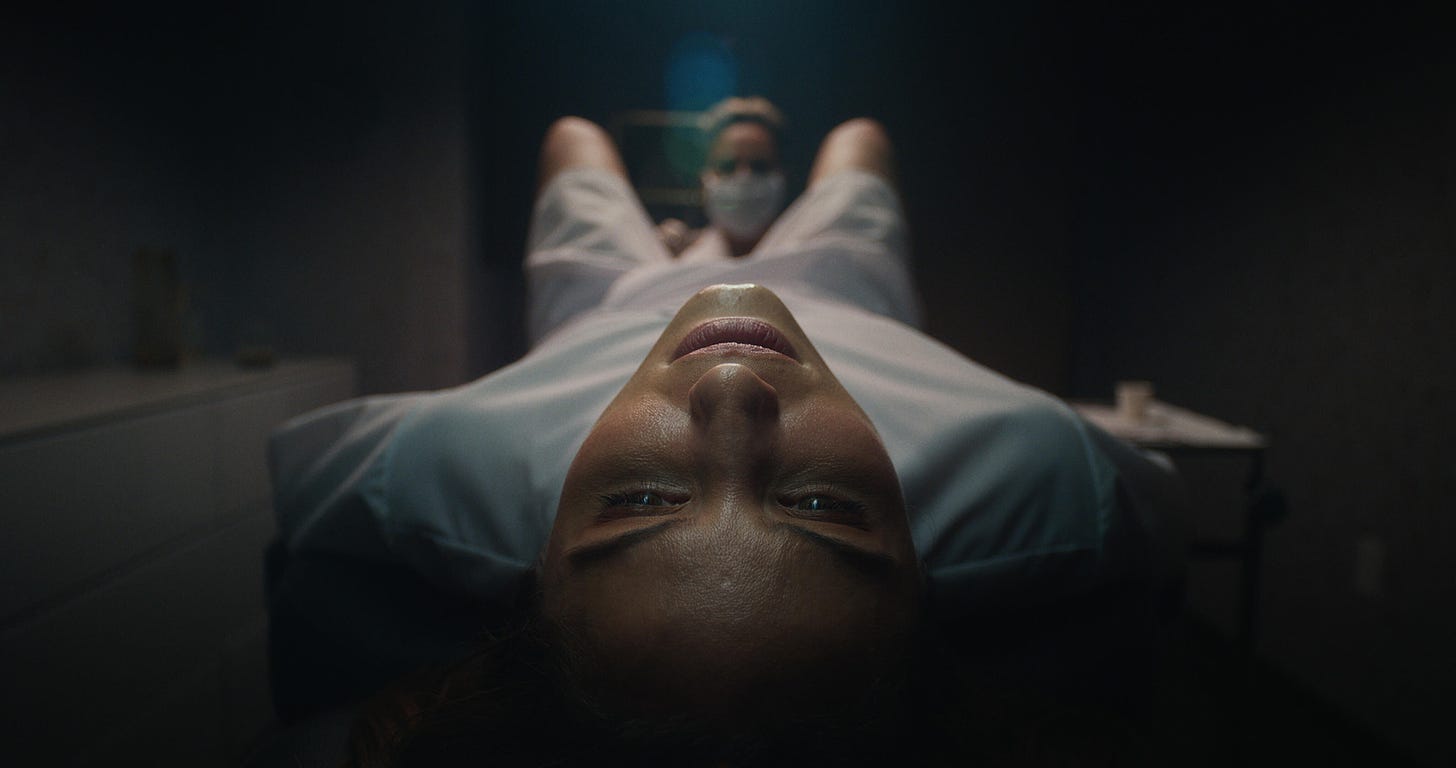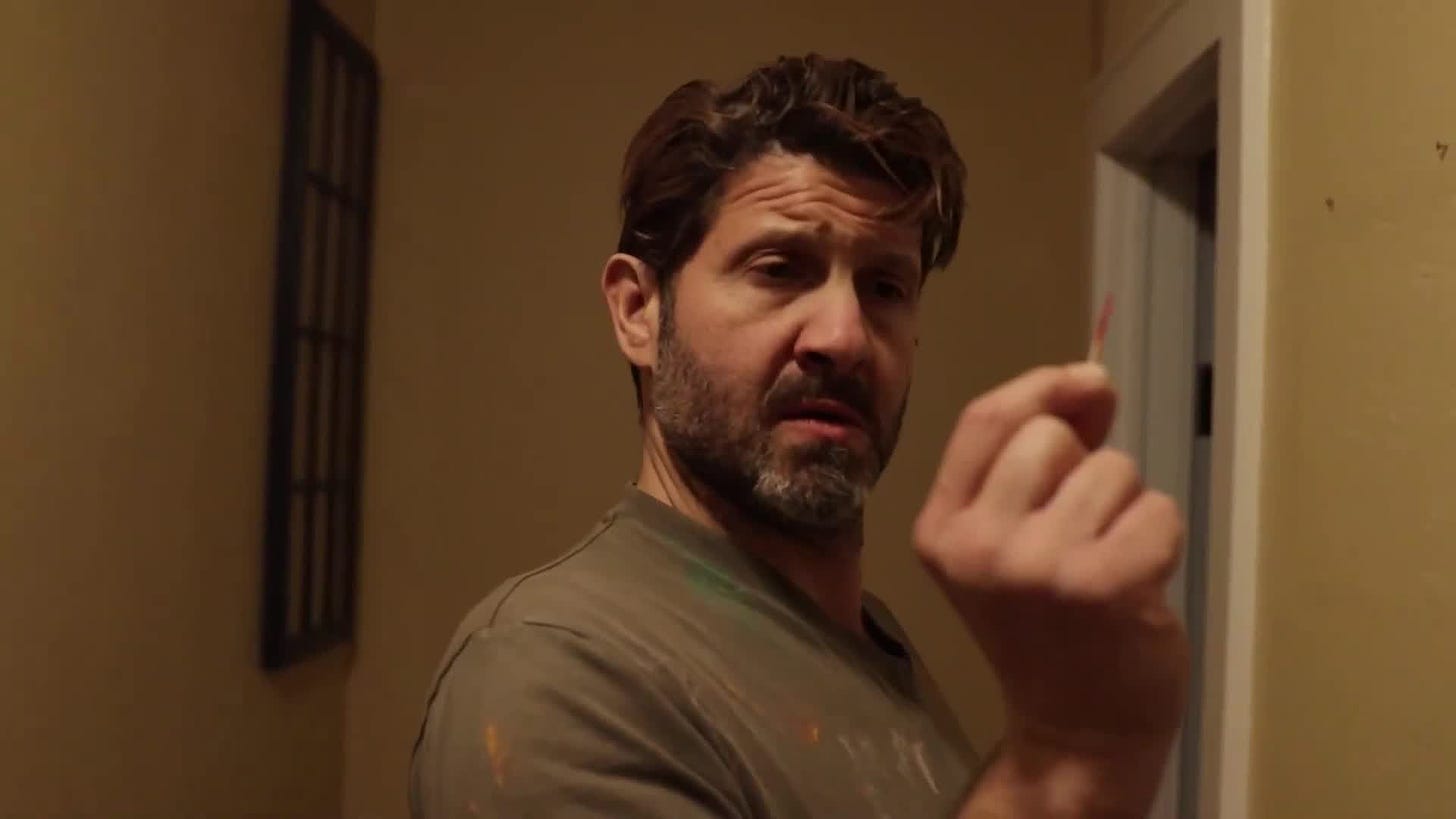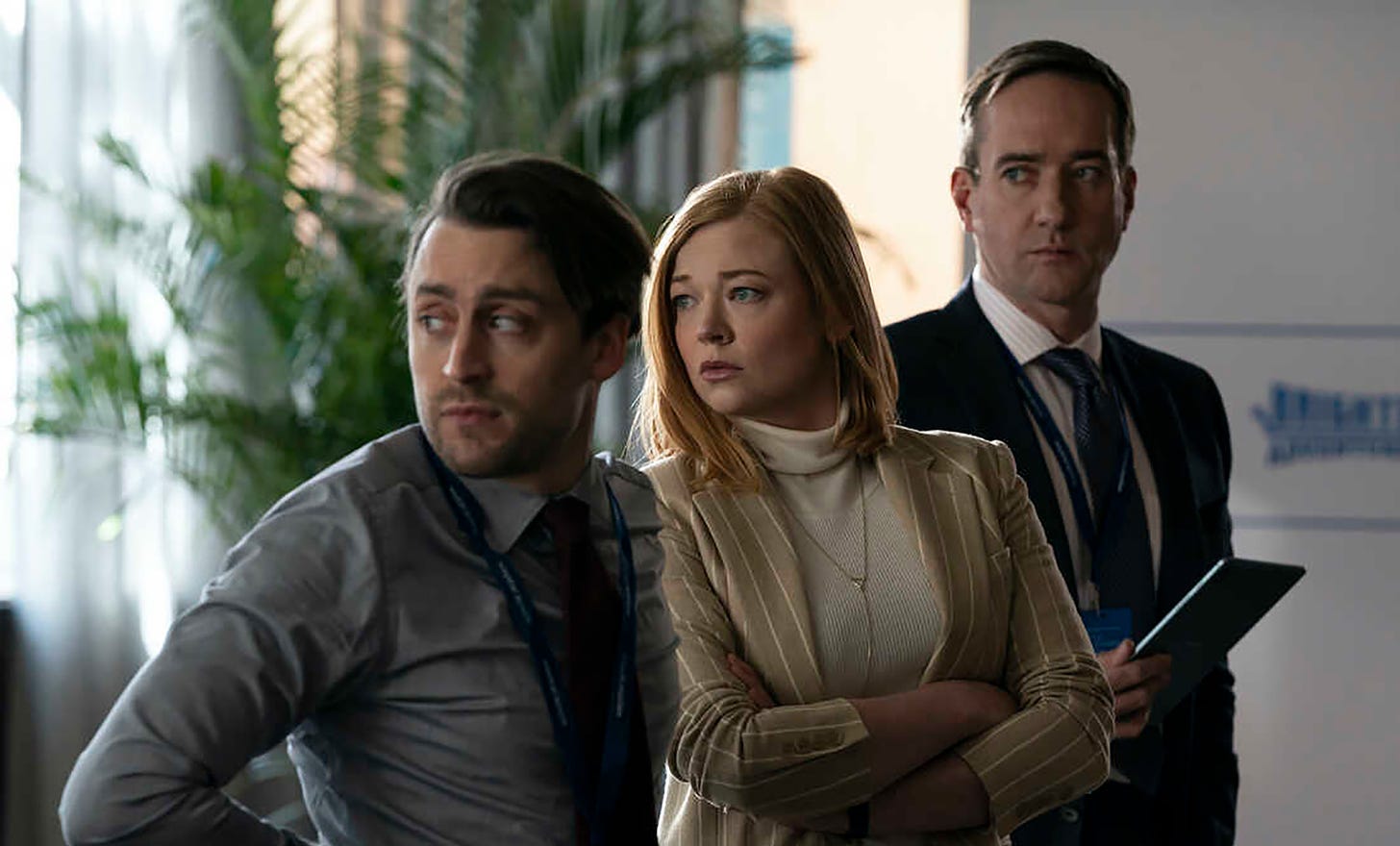A day after I giffed the repeated, censored f-bombs from SPIDER-MAN: FAR FROM HOME and SPIDER-MAN: NO WAY HOME, James Gunn and Marvel release a clip from GUARDIANS OF THE GALAXY VOL. 3 where Star-Lord says the f-word in all its PG-13 glory. I guess it’s the director’s “goodbye” to the fans (people seemed to really get excited about it) as he leaves to become DC’s Kevin Feige. And why not? If any segment of the MCU deserved an f-bomb, it is definitely the Guardians. So, it was surprising to discover the other three censored examples didn’t come from any of their films (unless Groot has been saying it since Day One). All five are collected here.
This week’s review rundown is low on movies because I was waiting to hear back from a couple publicists only to receive crickets. So as not to block those titles if they came through, I went heavy on TV—finishing SUCCESSION season three and binging TOTALLY COMPLETELY FINE. I’m glad things turned out that way because the latter was really, really good. It was the kind of season that can both standalone with emotional potency and continue. Full thoughts are below.
What I Watched:
CLOCK
(now streaming on Hulu)
Some people become more defiant when told by countless people that they “must” do something. Others begin to wonder if perhaps they’ve been the ones who were wrong for not wanting to comply. Reducing what occurs on-screen in Alexis Jacknow’s CLOCK to a simple either/or scenario isn’t necessarily doing its psychological complexity justice, but I think it can get you to start understanding the trauma that results. Because when something like pregnancy is suddenly rendered with life-or-death connotations bolstered by the added societal pressure of “normalcy” and generational pressure of survival, it cannot be easily reversed. If Ella Patel (Dianna Agron) is “wrong” for not wanting to bring a child into a world destroying itself or ruin an already full life, being “right” isn’t just a matter of changing perspective. It’s about repressing your very identity to conform.
What can that look like? Psychosis. Some of it is overt like the specter of a tall woman in black that’s found to be ingrained inside Ella’s DNA. Some of it is imperceptible—the way Jacknow transforms the screen after a climactic moment will have you wondering how you missed just how different the image had become. The fertility specialist Ella sees (Melora Hardin’s Dr. Elizabeth Simmons) is quite literally rewiring her brain under the belief that all women have a biological clock and not feeling it is merely a hormonal and/or psychological imbalance. In order to flip that switch, she must force her patients to confront their fears. In so doing, however, she also gives those fears form. No longer dormant metaphorical notions woven into her very psyche, the tall woman, clock, and spiders must manifest to survive. You cannot simply erase such powerful markers.
It’s a fascinating character study augmented by a father (Saul Rubinek) whose own biological clock is ticking with the idea that everything his Holocaust surviving relatives did to keep their family tree alive will soon be for naught. Then there’s the understanding husband (Jay Ali) who Ella can’t help but think is sacrificing his own dream for family to let her remain childless. And her pregnant best friend (Grace Porter) reminding her of what society demands out of its women: maternal bliss. Ella is willing to derail her success to satisfy them all, though—to give her father grandchildren, her husband a child, and her friend a partner in motherhood. But doing so means ignoring who she is on a fundamental level. Is wanting to be a mother worth such a transformation? How relentless will the push back be from all that she suppresses to achieve it?
The final reveals are a bit too on-the-nose considering how nuanced so much of CLOCK proves in the lead-up to them, but I won’t pretend they aren’t effective in their job to bring the underlying symbolism into the real world. Agron is very good in the lead role, constantly bombarded with sensory motifs and disturbing actions born from this idea that motherhood must be the end-all be-all of Ella’s existence. Don’t therefore wonder about certain strange behavior like watching her put a carton of eggs into the freezer. It’s not a mistake. Jacknow doesn’t put anything on-screen without purpose and trusting that fact allows the off-kilter atmosphere to hit harder because we aren’t worrying about incongruities. This is the story of a woman surrounded by fanatics attempting to indoctrinate her against her will. Because despite volunteering, the violence that ensues proves she does not consent.
- 7/10
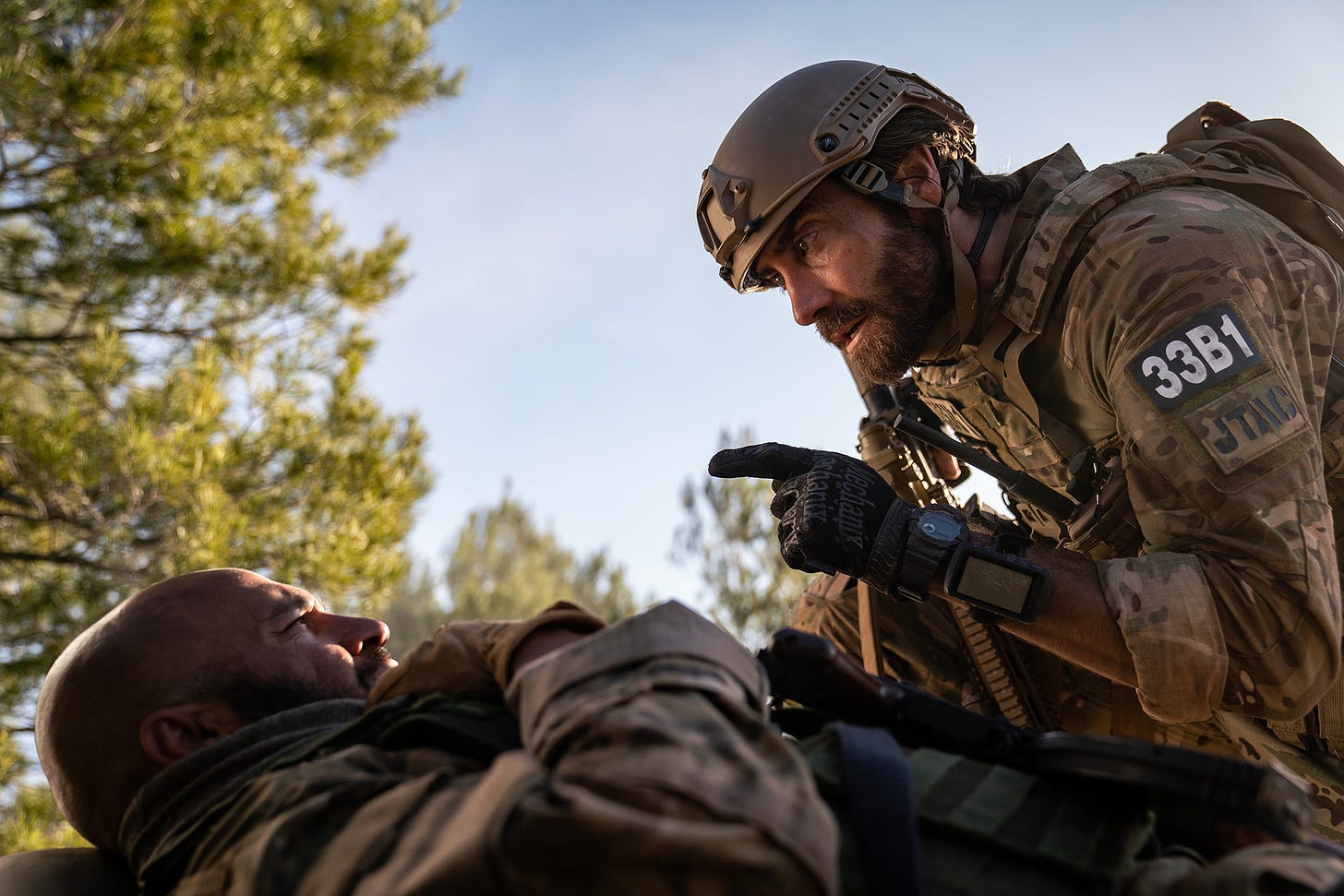
THE COVENANT
(now in theaters)
I’m a Guy Ritchie fan, so I can say that it’s weird to see him direct a “real” movie. Even KING ARTHUR: LEGEND OF THE SWORD and ALADDIN feel like “Guy Ritchie” films in their quick-paced and stylish backstreet criminality. So, I don’t think I was wrong to assume the trailers for THE COVENANT were simply sidelining his wit. That it would still be a defining feature, nonetheless. Ritchie even co-wrote it with usual suspects Ivan Atkinson and Marn Davies—another earmark for some goofy Hugh Grant or overcooked Jason Statham cameo that never comes. Because this is a bona fide earnestly drawn military brotherhood, behind enemy lines, against all odds survival film. There’s no time for humor or hijinks. The stakes are too high for frivolity.
As such, we get a chance to see Ritchie’s storytelling prowess isolated from his trademarked tone. That means less cuts (besides fever dreams) and more emotion. How far will Ahmed (Dar Salim) go to save the life of his Sergeant when it means dragging him through mountain terrain in Taliban territory? How far will Sergeant John Kinley (Jake Gyllenhaal) go to repay the favor by pulling all the stops to secure his savior visas so he and his family can find sanctuary in America? Because despite what popular jingoistic media would like us to think about Uncle Sam doing right by its native translators risking their lives in countries where doing so marks them as traitors, we all saw the footage of people being left at the airport when Biden pulled US troops from Afghanistan. Most of these men and women don’t get to leave.
The narrative is obviously heavy-handed, if not manipulative, in its motives as a result. Not only is the film literally just two acts of quid pro quo heroism that can’t avoid an almost fantastical air of hoo-rah patriotism, but Ritchie bookends everything with text that describes just how rare what he’s put on-screen is. With that built-in background, everything gets rendered with an even greater mythologizing. To see what Ahmed must do to keep John alive goes beyond the inspirational and into the superhuman as adrenaline pushes him to Rocky Balboa heights of physical perseverance. And watching John berate his peers and superiors into doing right by this translator forces the military to endure a bit of its own medicine since his survival earns him a level of mass media clout that has them not wanting his fight to go public.
And all that’s fine in the end. The idea that these two men learn to respect each other as human beings despite their different origins becomes little more than the scaffolding with which to put them through the wringer to see if they come out the other side. Ritchie and company are very clear that the Taliban are the enemy, not brown people nor Muslims at-large. So, the moment Ahmed proves his hatred of the Taliban is the moment John trusts him since the racist dehumanization of the “other” is literally all the military is these days. Once that happens, the film is both men running through walls for the other. Good surviving evil with a story that can’t help twisting Uncle Sam’s arm into keeping his promises. That Salim and Gyllenhaal are so good almost seems like an afterthought because Ritchie has us too involved in their characters’ plight to get distracted by the artifice.
- 8/10
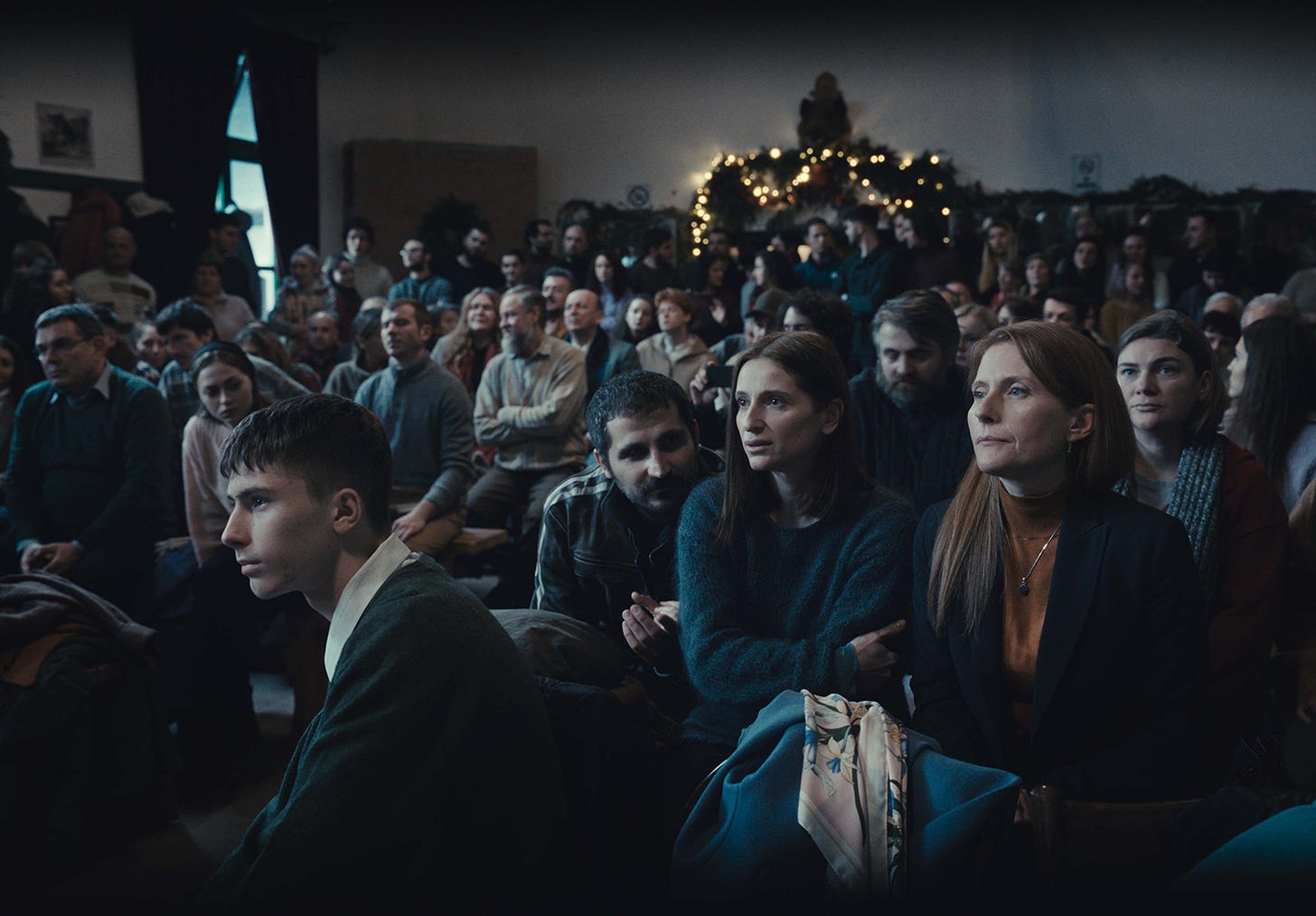
R.M.N.
(now in limited release)
Much like Matthias’ (Marin Grigore) father, you wouldn’t know his Transylvanian hometown was ill. While he can take Papa Otto to the hospital and get a brain scan, however, it’s not so easy to look under the surface of a place—especially not for those entrenched within. We as outsiders know. We can look at the attitudes and strife and see that this is an unhappy world. Most of its population has gone abroad for work. Those who’ve stayed can barely afford to exist in low paying jobs, if they’re working at all. Everything seems to be falling victim to choice regardless of age due to a scarcity of time and energy. Choir or orchestra? Minimum wage or exile? Die working or lose everything? And the lack of concrete answers only makes matters worse since the unfortunate human drive for self-preservation demands malice towards those we perceive as threats.
It starts with Matthias going on the run after head-butting his German employer for calling him a “Gypsy”. The character’s anger doesn’t stem from it being a racial slur, though. Matthias has been raised to hate Romani too being born in a place with its Hungarian and Romanian population always aligning to driving them out despite agree on little else. He therefore lashes out with a knee-jerk impulse to remind a world that sees him as the “other” that he’s actually one of the “good ones” (although acts of violence, justified or not, do him no favors in terms of changing minds). That’s who he is, though. A toxically masculine man’s man who thinks being a father means teaching his young, sensitive son how to survive an apocalypse on his own. Violence is a tool. Violence asserts authority.
You won’t then be surprised by what he witnesses upon returning home. An old flame (Judith State’s Csilla) has been helping the owner of the bakery she runs to hire foreign employees to affordably raise their payroll to a point where they can apply for increased EU member aid. She tried hiring locals, but the numbers only work if she offers minimum wage. And since their minimum wage is far less than the salaries farther west in Europe, residents would rather leave. The relativity of it all, however, means their minimum wage is conversely higher than that of countries farther east. So, in come two Sri Lankans. Kind and hard-working men who prove to their coworkers and Csilla that they’re a boon to the community. With the Romani still fresh on everyone’s minds, though, the town sees them as invaders. The first wave of disease-ridden, godless monsters come to take control.
Matthias should be someone who can see through this fear-driven lie. He was disrespected in Germany. He knows what it is to be unwanted despite only looking to make a living. And yet the parallel is willfully ignored. Suddenly he has power again. Is it worth relinquishing that superiority with the townsfolk to have Csilla’s back? No. He can’t look like a coward. Just like he won’t let his son be afraid of his Boogeyman despite everyone around him being afraid theirs. Because there’s no difference. The anxiety the boy feels walking alone through the forest is the same as that which the community feels when spouting lies about newcomers being dirty with disease. Saying you don’t have a problem with them as long as they stay in their country, while actively sending yourself to other countries is textbook xenophobic fearmongering.
R.M.N. writer/director Cristian Mungiu eases us into this reality with quiet contrasts before letting sparks turn into an inferno. The film is calling out everyone, the capitalistic system they’re gaming, and crutches like religion that they wielded to support their bigotry. It does so through underlying themes and overt dialogue once a long single-take town hall exposes the hypocrisy and exploitation running rampant on both sides of the argument. You can’t demand EU support and refuse immigrants. You can’t say you did all you could to hire locals without offering a living wage. You can’t call a human being an animal when you’re the one threatening to kill him/her. It’s a tense affair that ultimately puts Matthias in the middle to finally pick a side, culminating in an unforgettable night-time conclusion that brings everything full circle to reveal the thing we truly fear is us. Our mistakes. Our violent rage. Our insignificance.
- 8/10
RETURN TO THE THEATRE OF TERROR
(now on the festival circuit)
Much like his 2019 omnibus THE THEATRE OF TERROR, writer/director Tom Ryan again uses his production company’s moniker to deliver a second feature-length compilation of his latest four shorts: RETURN TO THE THEATRE OF TERROR. Set inside the auditorium of a shutdown cinema, Colin (Ryan) appears as usher and projectionist to help us find our seat alongside a young boy named Jack (Jack Ryan) who stumbled in while goofing around with his friend Cody (Cody Cario) outside. Some banter comments on the current state of film (Jack likes watching movies on his phone) before Colin fires up the first title with a cautionary warning. What starts as popcorn fodder soon shifts to unexplained horrors, bleeding off the screen to ensure their viewer receives a first-class experience in low budget scares.
That’s the first thing you should know going in. This is as indie as indie gets. While that means the odd distraction (fake mustaches, iPhone lock screens, etc.), it doesn’t mean a lack of effort or ingenuity. The special effects throughout are quite good and the acting (courtesy of faces you may recognize from television) always gets the job done. If I were to criticize one thing about the whole, it would be the runtime because two-and-a-half hours is a large commitment it cannot sustain. Most of that is the result of chapter two’s SPLINTER being an hour all its own, but I’d argue every short besides the first, SOOTHSAYER, could do with some trimming. SPLINTER and HAUNTED fall prey to too much “telling” despite both already “showing” everything we need and ROBOT can get a bit repetitive as we wait for the titular object to charge.
• SOOTHSAYER is the best of the bunch—a true TWILIGHT ZONE homage that deals in the emotional consequences arising from knowing that which you shouldn’t know. Dr. Robert Serling (Anthony Robert Grasso) and Karen Wells (Samantha Lacey Johnson) have created a time traveling machine that replaces physical transference with mental projection. It’s an intriguing spin on a familiar trope that leaves the brief images a traveler sees without the context necessary to truly know what they mean. Are they destined to occur? And, if so, will anything their witness does to alter them only guarantee they come to pass?
• SPLINTER should be the best and it would be with some additional editing to tighten things up and give the audience the benefit of the doubt as far as fully comprehending what Ryan is doing. The constant bombardment of literal visual proof undermines the script’s ability to let the implicit speak. Because there’s more to its make-up effects surface than meets the eye once it touches upon generational trauma and karmic retribution in a setting ravaged by tragedy at the hands of colonizers. Mature themes dealing with complicity and abandonment move from their impact on a single family (Jim Thalman and Kristin Muri’s Scott and Teresa Wills) to a town covered in the blood of innocent souls. It proves to be the most memorable regardless.
• HAUNTED is a lot of fun. Brett Eidman is having a great time as charlatan Carl McGavin, a “ghostbuster” of sorts who charges naive women $800 to close windows and push in plugs so they aren’t “terrorized” by the cool breezes and flickering lights of poltergeists. So, when we witness what looks to be a real haunting in Heather Freeling’s (Jennifer Plotzke) house courtesy of her daughter Carolyn’s (Emma Waldron) stuffed animals floating in the air, we anticipate a comeuppance. Carl will think it’s their imagination until seeing it with his own eyes and realizing he has no clue what to do, right? Not quite. He will eventually face the consequences of his lies, but it comes with a surprising genre switch.
• ROBOT is the slightest of the bunch despite its underlying theme of domestic abuse. Since that violence is used more as a catalyst for where its sci-fi premise will target its aggression than something to truly dig into and explore, however, it’s difficult to really take its superficial presence seriously. We know the robot Jack (Ryan) finds near a meteorite crash site is the real focal point, so we’re mostly made to wait and see what it has in store. Will it protect its new owner? Or does it have ambitions of its own?
- 6/10
SUCCESSION: Season 3
(now streaming on HBO Max)
It might be a chicken/egg situation, but it’s difficult to watch season three of SUCCESSION—while knowing season four will be the last—without feeling as though it’s little more than a bridge. Even at only nine episodes (all others are ten), the narrative finds itself grasping at straws as it looks to both puff up the first half finally tying off what Kendall Roy (Jeremy Strong) initiated in season one and manufacture a new conflict in the back half that can push us into the endgame. That’s what’s happening. Jesse Armstrong is sewing all his threads together so he can deliver the finale we all want, one that finally lets the cracks in the Roy family consume them all. Because the fate of Waystar/RoyCo is inconsequential. It’s merely a setting for Kendall, Shiv (Sarah Snook), and Roman (Kieran Culkin) to take out their knives.
As such, season three is the weakest yet. It lacks the panache of season one and the sturdiness of season two, yet “Mass in Time of War” might end up being my favorite episode of the entire series because it actually focuses on the kids. Big Bad Daddy Logan (Brian Cox) is sidelined so Ken can pitch his siblings the objectively good ideas he has to yank their family’s legacy out of the fire. He had it right in season one when he called a board vote only for Roman to screw him. He had it right a few episodes later initiating the “bear hug” only to screw himself (Logan publishing rumors about his addictions to hurt him ultimately causes him to use again, but saying Logan is the reason for everything becomes a cop out once his “kids” turn thirty and still grab at his shirtsleeves). Ken realizes he can’t do it alone, but his bridges may already be burned.
So, it’s up to subsequent episodes to quell the flames he started. Half are burning at the hands of rivals attempting a hostile takeover (season one). Half arise from the Department of Justice threatening fines and jail (season two). It’s all pretty monotonous. Ken screams louder and louder until he realizes his complicity in the destruction. Shiv and Roman whine louder and louder until they realize they don’t have what Ken has and Dad didn’t even want to pick him. The result is a game of checkers where Logan manipulates them around the board to better galvanize his own position to either lead or cash out—whichever seems right at the time is right for him. He sits on his phone while the kids spin around chasing their tails thinking they’ve been playing chess and we’re supposed to believe something of substance is happening. It isn’t.
Not all is lost, though. Because while the plot itself is rushed to get everyone in place for season four (I’m an Alexander Skarsgård fan, and he’s good here, but did the Emmys really nominate him for playing the role of cardboard pawn sounding board?), the comedy has never been better. I probably laughed more during this season than the previous two combined. Strong just keeps getting better with a beautifully layered performance of kicked puppy in a peacock suit that never fails to make us want to laugh at him when he’s not utterly shattered. Snook’s legitimately on-point delivery of sarcastic remarks that everyone in the room would guffaw at if she were a man and had any experience in the company land with a brilliantly cultivated thud that earns an effectively awkward air of queasiness. And Culkin stunned me a bit. He’s always been the comic relief, but Roman’s insecurities are never more prevalent than when he believes he’s doing good. It leads to a devastating final episode performance.
The rest is mostly fluff. Harriet Walter’s Caroline is dragged back for decent deflection. Nicholas Braun’s Greg has less to do than ever before as he’s trotted out to worry about getting arrested while being leveraged by everyone like a poker chip. Matthew Macfadyen is the exception. He conversely gets the meatiest arc Tom has secured yet, although I wonder if perhaps it’s too subtle insofar as its impact on the overall plot (but that could be a testament to the writing and him since we’ve been conditioned to believe we, like the family, know him). His trajectory is a nice straight line through the otherwise mix of twists and turns that are really just dead-ends and red herrings filling out the runtime. Because while the Roys themselves have believed this was a four-way fight (sorry, Connor), it’s always been the Us vs. Him season four has finally been set-up to become.
- 7/10
TOTALLY COMPLETELY FINE
(now streaming on Sundance Now)
Don’t go into Gretel Vella’s TOTALLY COMPLETELY FINE thinking it’s simply going to deliver a maturation arc for its main character Vivian Cunningham (Thomasin McKenzie). She and her writers’ room know human nature isn’t so easily swayed. This is a young woman haunted by visions of her parents’ death, after all. Being the only child in the car at the time, Viv’s the only one who knows for certain what happened. Unfortunately, being so young back then means her grief and guilt have constantly been manipulating that truth. Her mind hides details when it suits its self-loathing. It triggers emotions when her older brothers’ (Rowan Witt’s John and Brandon McClelland’s Hendrix) eyes and voices force her to believe it was all her fault. No one should therefore be surprised she once attempted suicide. Or that we meet her about to try again. Life just isn’t quite done with her yet.
Whether that means the phone call telling her of her grandfather’s death was fated to prevent the hair dryer from falling into the tub is up to you. Just like Amy Matthews (Contessa Treffone) thinking a brolga walking around the day of her wedding has Viv’s grandfather’s soul inside it is up to her. Truth or plausibility (or even sanity) don’t matter. The thought kept Amy going when all seemed lost. And maybe it can keep Viv going too if she’s willing to let herself get out of her own way. Because she’s the roadblock to her own happiness. It’s not John always being angry with her or Hendrix smothering her with positivity. She merely processes those things through a filter of blame and worthlessness. Vivian hears a compliment and assumes it’s patronizing. She hears an insult and spirals down into the self-destructive abyss she calls home.
Except now there might be a path back to even-footing—the likes of which she’s never known since before the crash. It comes via bequeathment as her grandfather decides to split his assets three-ways (through his lawyer Wilkinson, the always entertaining John Noble). Hendrix gets the golf clubs. John gets the massage chair. Vivian gets the waterfront property. So, monetary “fairness” isn’t quite being met and John has reason to be frustrated since his food truck was recently burnt to a crisp by Viv. He therefore wants her to sell and pay him. She wants to bask in the rent-free lifestyle drug/sex addicts like her aspire to attain. Grandpa had another thought, though. Because what no one in the family knew about this house was that the cliff behind it was the most popular suicide venue in all of Australia. Neighbors say he saved over 200 lives. And on her first night there, Vivian unwittingly saves Amy.
The rest of the series could have comfortably settled into a “suicide of the week” template afterwards. If this show was made ten years ago, it probably would have done exactly that. But that’s not the point. A suicidal person doesn’t just miraculously heal upon deciding not to jump. And Vivian doesn’t just stop hating herself because she saves a few people. We’re dealing with years of pent-up feelings from everyone on-screen. Good deeds and transformative desires will not combat a direct hit of the opposite and the justifiable narcissism that results will not allow any of these broken people to truly be able to help another when their first thought is to defensively remind the group that they have it worse. It’s why Amy is such a crucial piece to the whole and why being such renders her journey through domestic abuse (James Sweeny’s always-smiling George) and the fear of losing herself so devastating.
Add Hendrix’s martial struggles since fatherhood and his wife Laura’s (Mia Morrissey) inability to cope. Add John’s cold, clinical view as the elder statesman whose martyr complex won’t allow him to show feelings about to risk ruining his romance with Alejandro (Édgar Vittorino). Then there’s the neighbors too. Dane (Devon Terrell) the control freak psychologist. Louis (Max Crean) the 50s-cosplaying paperboy. Beatrice (Deborah Kennedy) the pot-smoking former friend of grandpa. They all look like a laundry list of caricatures thrown together for comedic hijinks and yet each holds a darkness that Vivian’s whirlwind of swear words and truth bombs has the unique power of bringing out. None of them is a passenger either. Each is critically important to the other’s ups and downs. Salvation and damnation.
And that’s where Vella’s work shines. There’s a reason every episode begins with suicide prevention verbiage and phone numbers. Because no matter how funny or perhaps silly things get, she pulls zero punches insofar as the mental hardships and psychological roller coasters these characters must endure. Just when things start looking good, something happens to pull everything back even deeper into the dark than before. Those who finally escape their monsters stumble right back into their arms. The voices that tell them all they aren’t worthy of happiness slide right back into being heard when tragedy inevitably strikes again. McKenzie carries the biggest load as lead, but everyone is battling something that possesses the strength to burn their worlds to the ground. Like Amy says about Vivian, though, it’s never without hope. Just don’t forget the tissues.
- 9/10
New Releases This Week:
(Review links where applicable)
Opening Buffalo-area theaters 4/28/23 -
ARE YOU THERE GOD? IT’S ME, MARGARET. at Dipson McKinley, Capitol & Flix; AMC Maple Ridge; Regal Elmwood, Transit, Galleria & Quaker
BIG GEORGE FOREMAN at Dipson Capitol & Flix; AMC Maple Ridge & Market Arcade; Regal Elmwood, Transit, Galleria & Quaker
THE BLACK DEMON at Dipson Capitol; Regal Transit
BLIND WILLOW, SLEEPING WOMAN at North Park (select times)
POLITE SOCIETY at Regal Elmwood, Transit, Galleria & Quaker
PONNIYIN SELVAN PART - 2 at Regal Elmwood & Galleria
SISU at AMC Maple Ridge; Regal Galleria & Quaker
STAR WARS: RETURN OF THE JEDI at Regal Galleria & Quaker
VERMEER: THE GREATEST EXHIBITION at North Park (select times)
Streaming from 4/28/23 -
AKA - Netflix on 4/28
CLOCK - Hulu on 4/28
Thoughts are above.
FROM BLACK - Shudder on 4/28
HEADLESS CHICKENS - HBO Max on 4/28
PETER PAN & WENDY - Disney+ on 4/28
THE MOTHER - Netflix on 5/2
Now on VOD/Digital HD -
ALL THESE SONS (4/25)
BLOOD RELATIVES (4/25)
“Segan and Moroles excel at bringing heart (albeit jaded) to the whole. Because this isn't your usual master and sire relationship. This is deadbeat dad stepping up and rebellious teen doing all she can to ensure doing so won't be easy.” – Full thoughts at The Film Stage.
HUNGRY DOG BLUES (4/25)
MY HAPPY ENDING (4/25)
“Put their eclectic backstories together and you have a perfectly quirky trio of voices to put Julia on the correct path to recovery via humor and tough love. If only life were so neat and tidy.” – Full thoughts at HHYS.
RETURN TO SEOUL (4/25)
“This journey is less about forgiveness or hate than it is acceptance. Acceptance for her past, present, and future as well as the role she plays in all three no matter what externally unfair hand she might have been dealt.” – Full thoughts at HHYS.
SCREAM VI (4/25)
THE TANK (4/25)
THE ARTIFICE GIRL (4/27)
“Ritch's script might be dense, but it is fast-paced with an electric rhythm that never allows the rhetoric to bog down the drama. A lot of that is due to Matthews' performance.” – Full thoughts at The Film Stage.
FREAKS VS. THE REICH (4/28)
RADIANCE (4/28)





